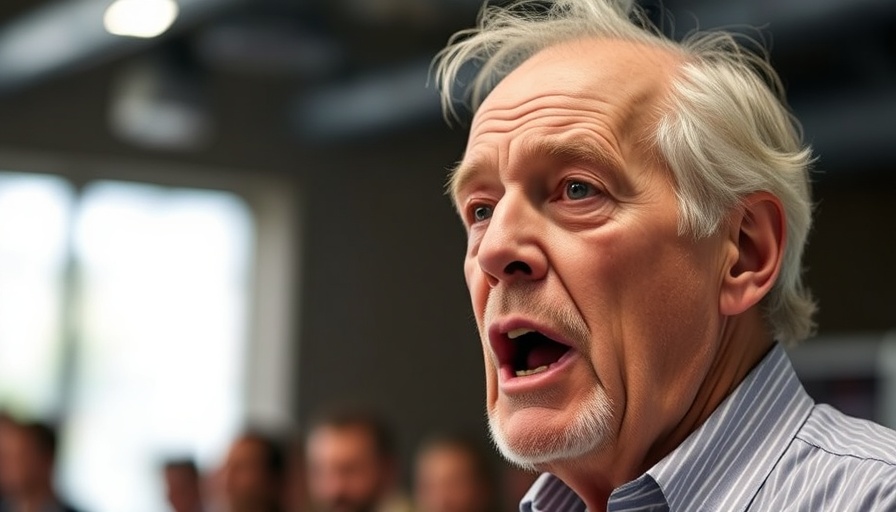
The Current Economic Climate: A Nation in Precaution
As of March 10, 2025, the United States finds itself at a critical juncture, both economically and politically. The stock market's recent decline, driven by looming recession fears linked to aggressive tariff policies, has left many Americans uneasy about the future. In a broader context, Secretary of State Marco Rubio's announcement, revealing that 83% of USAID programs have been terminated, adds another layer of complexity to the national landscape. With significant cuts poised to affect foreign aid and development initiatives, truthfully, the stakes are high for both domestic and international interests.
Understanding the Impact of Recession Fears
Recession, often characterized by a decline in GDP for consecutive quarters, has increasingly become a buzzword among economists. With leading financial institutions such as Goldman Sachs and Moody's Analytics raising alarm bells, the implications of an economic downturn could be dire. Analysts suggest that not only could unemployment rates soar, but with tighter budgets, consumer spending—which accounts for approximately 70% of American economic activity—could dwindle under pressure.
Mark Zandi, chief economist at Moody's Analytics, has signaled a worrying escalation in recession probabilities, raising it to as high as 35%. The prevailing sentiment among critics is that the Trump administration’s tariff measures are exacerbating the risk, placing small businesses and local economies on shaky ground. As households work to rebuild their savings and reconsider expenditures, the repercussions of such economic anxiety ripple through communities nationwide.
USAID Termination: Foreign Aid's Ripple Effect
On another front, Secretary Rubio's decision to cut 5,200 of the 6,200 programs under the U.S. Agency for International Development further complicates the narrative. This sweeping pullback not only affects humanitarian efforts but also poses risks of instability in regions heavily reliant on U.S. aid. Critics argue that while the administration claims these cuts are necessary, such drastic reductions could diminish U.S. influence abroad, jeopardizing longstanding partnerships vital in today's global climate.
The administration's approach to foreign aid has sparked contentious debate, particularly among Democratic lawmakers who view these actions as a dangerous overreach. They advocate for a balanced argument that recognizes the value of U.S. programs which historically have served both humanitarian purposes and strategic interests.
Economic Policies and Public Sentiment
The overlap between domestic economic policies and foreign aid reflects a larger conversation about national interests and ethical governance. President Trump’s administration has taken a contentious stance by prioritizing tariffs and restructuring agencies, leading to a divided public opinion. Many citizens express concerns regarding the potential fallout from aggressive economic strategies that may shield against international threats but could also bring unnecessary hardship at home.
With a national focus on job security and economic stability, the administration's decisions will likely provoke heated discussions about the balance of protectionist policies versus the importance of global collaboration.
Possible Pathways Forward: Preparing for Uncertainty
The road ahead is fraught with challenges, but awareness and proactive measures can offer solace. For citizens, understanding changes in economic policies empowers them to navigate uncertainties. Community leaders and local businesses can serve as critical resources, providing guidance on budgeting and potential avenues for support, whether through state programs or local nonprofits.
Moreover, it's imperative for Americans to engage actively in discussions regarding policy changes, advocating for transparency and accountability from their elected officials. Active participation in these conversations can shape the outcomes of important legislative decisions, ensuring they reflect the collective interests of the citizenry.
Emphasizing the Value of Being Informed
The combination of economic uncertainty and critical shifts in foreign policy highlights the importance of informed citizenship. Access to reliable news sources equips individuals to stay updated, allowing them to respond to emerging issues effectively. Whether through digital platforms, social media, or traditional outlets, ensuring that citizens remain informed is essential to fostering a resilient democracy.
As we witness these pivotal moments unfold, the public must remain vigilant and engaged, continually assessing how these decisions impact their lives and the nation at large.
What You Can Do: Stay Engaged
Stay active and informed about national news and economic policies that could affect your community. Engage with your local representatives and partake in discussions that shape our world. Your voice matters—advocate for changes that promote stability and growth. Now is the time to ensure your interests are represented and heard.
 Add Element
Add Element  Add Row
Add Row 



Write A Comment